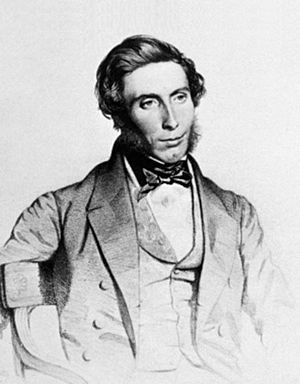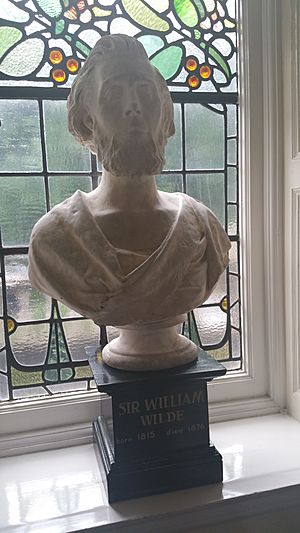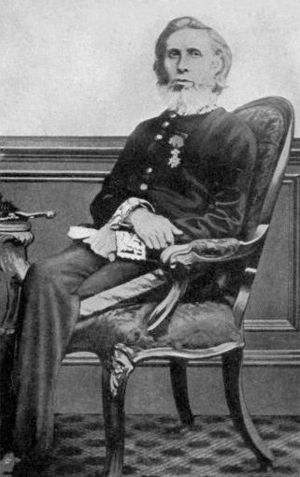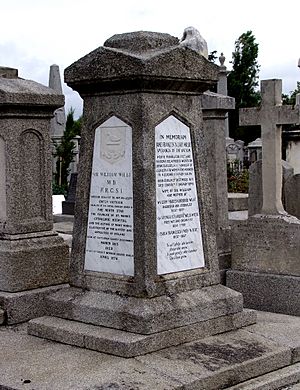William Wilde facts for kids
Quick facts for kids
Sir
William Wilde
|
|
|---|---|
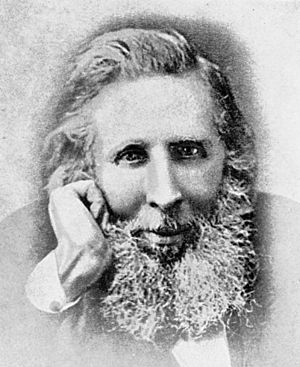 |
|
| Born |
William Robert Wills Wilde
March 1815 Castlerea, County Roscommon, Ireland
|
| Died | 19 April 1876 (aged 61) Dublin, Ireland
|
| Occupation | Surgeon, otolaryngologist, ophthalmologist |
| Spouse(s) | |
| Children | 6, including Willie and Oscar |
Sir William Robert Wills Wilde (March 1815 – 19 April 1876) was an important Irish doctor who specialized in eye and ear surgery. He also wrote many books about medicine, history, and Irish stories. He is famous for being the father of the well-known writer Oscar Wilde.
Contents
Early Life and Medical Journey
William Wilde was born in Kilkeevin, near Castlerea, in County Roscommon, Ireland. He was the youngest of five children. His family belonged to the Church of Ireland. His ancestors included a Dutch soldier who came to Ireland in 1690.
William first went to school in Elphin. In 1832, he began training to be a surgeon in Dublin. He learned from some of the best doctors in Ireland at the time. In 1837, he earned his medical degree from the Royal College of Surgeons in Ireland.
That same year, William went on an eight-month trip to the Holy Land with a patient. He visited many places around the Mediterranean Sea. During this trip, he even dissected Porpoises that landed on his ship and took notes. He later wrote a two-volume book about these sea creatures. In Egypt, he found a mummified dwarf and embalmed ibises, which he brought back to Ireland.
After returning to Ireland, Wilde wrote an article suggesting that one of the "Cleopatra's Needles" should be moved to England. Years later, in 1878, one of these ancient Egyptian obelisks was indeed moved to London.
Achievements and Recognition
William Wilde opened his own hospital in Dublin, called St Mark's Ophthalmic Hospital, which focused on eye and ear diseases. He became the official eye doctor to Queen Victoria. He even performed surgery on the father of another famous Irish writer, George Bernard Shaw.
Wilde had a very successful medical practice. His son, Henry Wilson, who was also a doctor, helped him. This allowed Wilde to travel more. He visited Scandinavia, where he received an honorary degree from Uppsala University in Sweden. The King of Sweden, Karl XV, gave him a special award called the Nordstjärneorden (Order of the North Star). In 1853, he became the first Surgeon Oculist in Ordinary to the Queen in Ireland, a new position likely created just for him.
He was made a knighthood in 1864. This honor was given more for his work on the Irish census (counting the population) than for his medical contributions. He had been a medical commissioner for the census since 1841. In 1845, he became the editor of the Dublin Journal of Medical Science and wrote many articles for it.
There is a special plaque at 2 Merrion Square, Dublin, dedicated to William Wilde.
Family Life
On 12 November 1851, William Wilde married Jane Francesca Agnes Elgee. She was a poet who wrote under the name Speranza. They had two sons, William (Willie) and Oscar, and a daughter named Isola Francesca, who sadly died when she was a child.
Sir William Wilde also had other children before he married Jane. He made sure they were educated and cared for by his relatives.
From 1855 until he passed away in 1876, William Wilde lived at No. 1 Merrion Square in Dublin. This building is now called Oscar Wilde House, named after his famous son, who also lived there for many years.
Later Years and Legacy
In his later years, William Wilde began to spend more time in the west of Ireland. In 1864, he started building his house, Moytura, which overlooked Lough Corrib in Connemara, County Galway.
Sir William Wilde passed away at the age of 61 in 1876. He is buried in Mount Jerome Cemetery in Dublin.
Publications
William Wilde wrote many important books and articles, including:
- Narrative of a Voyage to Madeira, Teneriffe, and Along the Shores of the Mediterranean, 1840.
- The beauties of the Boyne and its tributary the Blackwater, 1849.
- The closing years of Dean Swift's life, 1849.
- The Epidemics of Ireland, 1851.
- Practical observations on aural surgery and the nature and treatment of diseases of the ear, 1853.
- Lough Corrib, its Shores and Islands, first published 1867, republished 2002.
- 'The Early Races of Mankind in Ireland', The Irish Builder, 1874.
- Selected writings of Speranza and William Wilde, edited by Eibhear Walshe, 2020.
Books about William Wilde
- Victorian Doctor: the Life of Sir William Wilde, T.G. Wilson (Methuen, London, 1942.)
See also
 In Spanish: William Wilde para niños
In Spanish: William Wilde para niños
 | John T. Biggers |
 | Thomas Blackshear |
 | Mark Bradford |
 | Beverly Buchanan |


